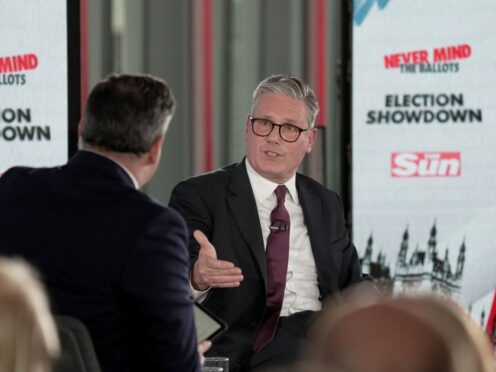Sir Keir Starmer has accepted his remarks about Bangladesh were “clumsy” after he was criticised for making reference to the country when answering a question about the deportation of migrants.
During a tense phone-in on BBC Radio 5 Live, the party leader was asked by a caller “how can we differentiate you with Nigel Farage” given “your recent racist comments”.
It comes after Sir Keir said “people coming from countries like Bangladesh are not being removed” from the UK currently while answering questions from an audience at The Sun’s election debate on Monday.
This prompted a backlash from within Labour ranks, including criticism from parliamentary candidates and a resignation letter from a Labour councillor.
Sir Keir told the caller he had not intended to cause offence or upset and was “genuinely, genuinely concerned if that was the case”.
Asked by presenter Nicky Campbell whether he accepted the comments had been clumsy, the party leader said: “Clumsy would be a good word, and I didn’t mean to offend anyone, I was simply answering the question.”
During The Sun’s election event, Sir Keir pointed to the number of people being returned to their home country dropping to 44% under the Conservative government.
He said: “So, in the first few days in government, I’ll tell you what I’ll do, I’ll put the staff back in the returns unit, I’ll make sure we’ve got planes going off, not to Rwanda, because that’s an expensive gimmick.”
Asked where they would be sent, he added: “At the moment, people coming from countries like Bangladesh are not being removed, because they’re not being processed.”
Following Sir Keir’s comments, Apsana Begum said migrants should not be “scapegoated” by politicians.
Ms Begum, the former MP and Labour candidate for the London constituency of Poplar and Limehouse, said in a post on X, formerly Twitter: “It’s totally unacceptable for politicians of any party to use dog-whistle racism against Bangladeshis or any other migrant community.”
My statement regarding the videos circulating online: pic.twitter.com/V5jyGtLkrw
— Rushanara Ali 💙 (@rushanaraali) June 26, 2024
She added: “We know where this leads, and why the Bangladeshi community led the anti-fascist fightback in the wake of the murder of Altab Ali in 1978 with the message ‘here to stay’.”
On Wednesday, deputy leader of Tower Hamlets’ Labour group Sabina Akhtar accused Sir Keir of singling out her community and insulting her Bangladeshi identity, before quitting over the remarks.
In a social media post, Ms Akhtar said she could not be proud of the Labour Party any more, adding: “It is clear the direction it is heading is unacceptable to me and my community.”
Shadow business minister Rushanara Ali said in a statement she was “proud to be the first British Bangladeshi MP” elected to the Commons.
The Labour candidate for Bethnal Green and Stepney in London said she was in close contact with Sir Keir over the comments and had relayed the communities’ concerns.
During a campaign visit to Staffordshire on Thursday, Sir Keir said he “certainly wasn’t intending to cause any concern or offence” to British Bangladeshis who have made an “enormous contribution to our country”.
He said he had instead meant that in relation to asylum seekers returns, Bangladesh is a safe country and one that had a returns agreement with the UK.
Sir Keir said he wanted to “build on the very strong relationship” the party already had with the Bangladeshi community in Britain if Labour, which enjoys a sustained double-digit lead in the polls, wins the election.
